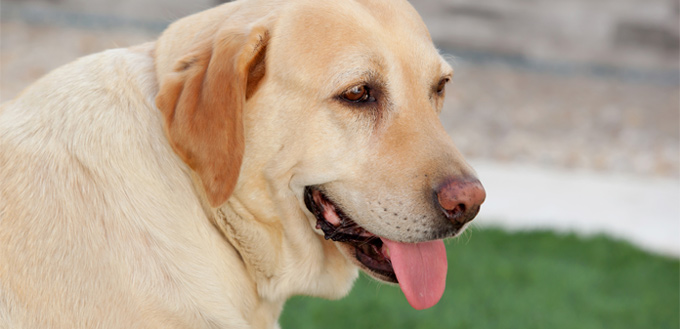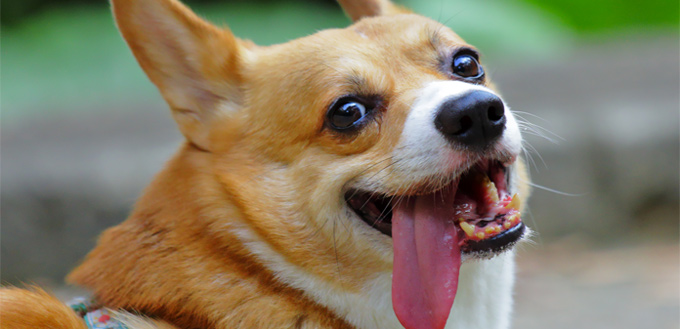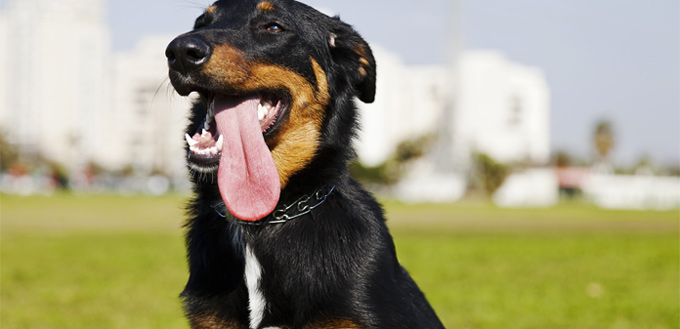In the very beginning, let’s clear up one thing – panting in dogs is normal. Depending on the breed, your dog may often pant when he is full of energy, excited, or hot. The experts define panting as shallow and rapid open-mouthed breathing, often in combination with tongue protrusion. When your dog pants, the air flow in the upper respiratory tract increases which leads to increased water evaporation.
Dogs use panting to maintain or lower their body temperature. During a single minute, your pooch will inhale and exhale approximately 30 to 40 times, but in the case of panting, this number rises up to 10 times. As mentioned, this is not a reason to worry because canine airways and lungs are elastic and they do not spend a lot of energy or effort for panting.

What Is the Difference Between Normal and Heavy Panting?
The thing that you need to consider is the difference between normal and heavy panting, which is also known as abnormal. If your dog is panting, he may have a healthy and natural response to overheating, and he is trying to regulate his body temperature. However, abnormal panting is something you should worry about as it may be a sign of a health issue your pet is facing with.
Here are some differences between normal and heavy panting:
- Heavy panting is anything that may seem excessive compared to normal panting you notice in your dog
- Your pet is panting although he doesn’t seem to be hot or when there isn’t an apparent need to cool down his body
- The panting noise is harsher, louder, or in any other way unusual compared to normal panting
- Your dog spends a lot of energy and effort on panting, which shouldn’t be the case
In short, any panting that seems out of the ordinary may be considered as abnormal or heavy. While you should make sure to react as soon as possible, there is no reason to panic. As soon as you notice signs of heavy panting, call your vet and schedule an exam so that he can determine the reason behind the issue.
What Can Cause Heavy Panting?
The list of things that may be behind heavy panting is rather long and includes:
- Heatstroke
- Genetic predisposition
- Pain
- Heart or lung disease
- Cushing’s disease
- Anemia
- Laryngeal paralysis
- Anxiety, fear, stress, and phobias
Heatstroke
Overheating is what causes panting in the first place, and it is only expected that your car will pant heavier the more overheated his body becomes. In the case of heatstroke, the body temperature of your pet would be 109F or higher. This may lead to many health problems, including brain swelling followed by seizures and ulcers caused by inadequate blood flow to the gastrointestinal tract. Body cells throughout your dog’s organism start to die, and there is also a possibility of kidney damage.
Aside from overheating, symptoms of a heat stroke include glazed eyes, excessive thirst, accelerated heartbeat and pulse and dark or bright red gums and tongue. Call your vet or a pet clinic immediately and if he confirms the heatstroke diagnosis, grab a towel and soak it with cold water (just cold enough and not ice cold). Wrap that towel around your dog and consider using a fan to accelerate the process of cooling down. Constantly monitor the temperature as it shouldn’t fall below 103F, or you may risk your pet getting cold. Your vet will probably ask to take your dog to a clinic immediately, which is what you should do.
It is best to prevent the heatstroke in the first place, which is why your dog should always have access to fresh water and shade. Avoid leaving him in a parked car even if it is just for a couple of minutes.
A Genetic Predisposition
Brachycephalic dog breeds include bulldogs, boxers, Boston Terries, Pugs, and other pooches with those faces that look like they were pushed in. Although that looks cute, it may also cause breathing difficulties which lead to heavy panting. Some of these dogs have a genetic predisposition of not being able to pant efficiently due to challenges in their upper airways. Unfortunately, that means they can suffer from heatstroke more often than other breeds.
Normal panting for these pooches is not the same “normal” as for other breeds, which is why you should take some time to analyze how their breathing patterns sound like. In case you notice something out of the ordinary, you should make sure to react quickly. If your dog is in the brachy category, be very careful when driving him around in a hot vehicle.

Pain
One of the reasons behind heavy panting in dogs can also be the occurrence of pain. If you notice frequent panting sounds appearing for no apparent reason or in times when they shouldn’t occur, that can be a sign your Fido is hurting. Your pet may be lying on the floor next to your couch, and you may hear abnormal panting, although there was nothing that could possibly cause this. It might be your pooch’s way of expressing that he is in pain, which is something that you should notice and arrange a visit to the vet as soon as possible.
Heart and Lung Diseases
Another cause of your dog’s abnormal panting may be dilated cardiomyopathy, which is a heart condition quite common in canines. Apart from this, you may notice that your pet is quickly becoming tired even during regular activities, such as walking. He may even experience coughing and have occasional fainting episodes. Take a look at your pet’s abdomen and see if it is enlarged – this may be a result of fluid accumulation due to heart disease, which may lead to abnormal panting and heavy breathing.
If you are wondering why panting occurs in dogs with a heart condition, it is because oxygen isn’t delivered to tissues due to the heart’s inability to pump blood throughout the organism in an efficient way. The body instantly reacts by trying to accelerate respiration, and abnormal panting occurs as a result.
The veins behind the heart face increased blood pressure as your heart loses the ability to pump the blood. Fluid accumulation and lung congestion may occur, and lungs may not be able to adequately transport oxygen throughout your body, which leads to heavy panting.
Cushing’s Disease
This is also known as hyperadrenocorticism. It may be hard to pronounce, but the important thing to know is that this condition occurs when too much cortisol is being released from adrenal glands. This may lead to all sorts of different symptoms, but the first one that you notice will be abnormal panting. Other symptoms of the Cushing’s disease include hair loss, weight gain despite eating lass, increased urination and thirst, and changing the color of the skin from pink to black or grey. You may also notice that your dog has bruises and that he is restless and irritable.
This disease may cause other health problems for your canine, which include diabetes, liver disease, pancreatitis, kidney failure, urinary tract, ear, and skin infections, as well as cognitive heart failure.
Anemia
Heavy panting again occurs as a result of oxygen deprivation. In the case of anemia, the inadequate amount of red blood cells and hemoglobin that transports oxygen throughout the body is what causes panting. As in humans, you may also notice that your pooch is lethargic, weak, or that his heart rate is accelerated. He may also experience lack of appetite, confusion, and his tongue or gums may become white or pale pink. Make sure to check his stool to ensure that he is not passing out blood.
Laryngeal Paralysis
Canine larynx functions thanks to cartilage and muscles that open and close it. However, if these do not work properly, your dog might experience decreased air flow, which may result in abnormal panting. Your pet’s breathing will usually become raspy and loud, and this is a sign to call a veterinarian as soon as possible.

Anxiety, Fear, Stress, and Phobias
There is a scientific term that covers all these – behavioral panting. In most cases, it will be followed by pacing, trembling, crying, whining, repetitive yawning, and lip licking. Your dog may also instinctively run to hide somewhere, and he may even face the loss of bowel or bladder control. Fortunately, the last one rarely happens, but what is more important is that these are just temporary reactions to his surroundings. In most cases, the canine will consider an event is happening around him stressful or in any other way unfamiliar, which will result in abnormal panting. This is not something to worry about as long as it remains a short-term problem.
If you notice that your pet’s response to fear is prolonged and chronic, this may lead to both emotional and physical disorders. It may also have adverse health effects and shorten the life expectancy of your dog, as well as affect his quality of life.
As with all other causes, it is strongly suggested to call your veterinarian and ask for a consult or an examination. This will secure to diagnose and treat the problem as soon as possible, which increases the chances of a positive outcome for your furry friend.
Sources:
- Laura Playforth, My Dog Won’t Stop Panting, What Should I Do?, Vets Now
- Dr. Sophia Catalano, Why Do Dogs Pant? Is Your Dog Panting Too Much?, PetMD
- Dr. Nancy Kay, When is Dog Panting Abnormal?, Pet Health Network
More Pet Product Reviews
Supplements For Older Dogs
Dog Weight Gain Supplements
Calcium Supplements for Dogs
Supplements For Pregnant Dogs
Calming Supplements For Dogs
Cranberry Supplements For Dogs
Probiotics for Dogs
Dog Joint Supplements







